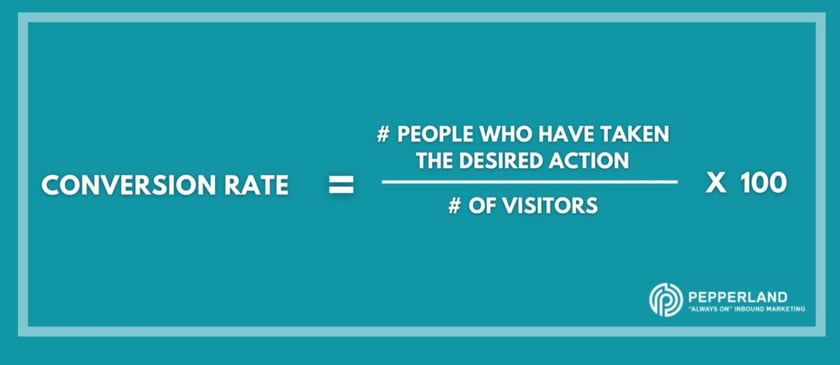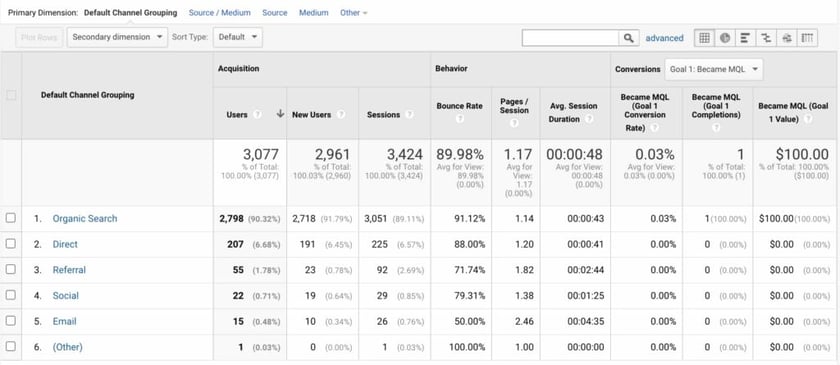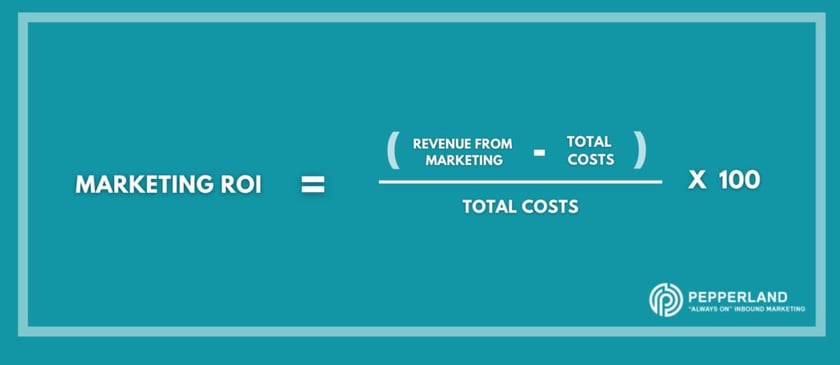Written By:
Kayley Blanchard
It’s important for marketers to know whether or not their marketing strategies are doing what they’re supposed to do. By measuring marketing effectiveness, you’ll have a better understanding of how your efforts are impacting your organization.
Here, you’ll learn:
-
Why marketers should measure marketing effectiveness
-
Four simple ways to measure marketing effectiveness
-
How to keep marketing aligned with business goals
Would you stick to a diet if you had no way to tell if it was working? Probably not. People diet because they know that the process works; there will be measurable results on the scale to quantify their progress toward their goals. People need to know that a process is working to justify spending time and money on it.
The same concept holds true for business functions like marketing. Marketers need to know that their efforts are working in order to rationalize taking the next steps. Why waste valuable resources for your business if your strategy isn’t doing what it’s supposed to?
As a marketer, you need to have a way to measure marketing effectiveness so that you can identify what’s working and take the necessary steps to adjust your inbound marketing strategy as needed. This will keep your efforts well-aligned with the goals that you’ve previously set for your campaign.
So, how will you know if marketing has been successful for your business? You’ll want to zero in on some Key Performance Indicators (KPIs) that will provide you with numerical proof that your efforts are (or aren’t) working, and also look deeper into marketing’s direct impact on numerical goals.
Let’s take a look at a few easy ways to measure marketing effectiveness.
How to Tell If Your Marketing Efforts Are Working
1. Look at your conversion rates.
One of the easiest ways to see whether your marketing campaign is working is to look at the conversion rates associated with your campaign.
A conversion refers to any desired action that you want a user to take, like filling out a form or making a purchase. Conversion rates take into consideration the percentage of users who converted in comparison to the total number of users. In other words, conversion rates tell you whether users are doing what you want them to do.

Your conversion rates can tell you a lot about a marketing campaign. For example, if you’ve just wrapped up an extensive content marketing campaign for your business’s website, you’ll want to look at both the overall Conversion Rate and the Landing Page Conversion Rates. If your conversion rates are low, that means that not enough users are clicking on landing page CTAs or making a purchase.
For marketing, low conversion rates can be representative of an ineffective strategy whereas high conversion rates tell you that your campaign is effective and you’re on track to meet your goals.
Use our Marketing Contribution Calculator
An easy-to-use, marketing contribution calculator that will automatically set your targets for you.
2. Track your website’s traffic sources.
If you’re not already, it’s crucial that you track where your website visitors are coming from. You need to know how much website traffic is being generated specifically by marketing so you can understand the effectiveness of your strategy.
For example, if you’re running a Google Ads campaign you’ll want to see how much traffic the campaign generated. Further, if the focus of your marketing campaign is on social media, you’ll also want to look at how many of your website visitors came directly from your business’s social media accounts.
You can view your organization’s traffic source reports within Google Analytics. Here, you’ll be able to see a breakdown of how many visitors visited your website after clicking on an ad, and how many were directed to your website after clicking on a link within your social media accounts.

Knowing where your visitors are coming from can help you to quantify the effects of your marketing campaigns on your company’s website traffic and determine if your strategy is effective.
3. Analyze your sales funnel.
Take a look at your organization’s sales funnel right now. How many of the prospects, leads, and customers in the funnel can be traced back to marketing?
If you can’t quickly reference some data and answer that question, that’s a problem. To measure the effectiveness of your marketing efforts, you need to understand how marketing has contributed to sales and revenue targets.
As a marketer, you have an obligation to generate leads that you will later deem to be qualified or unqualified before handing off the Marketing Qualified Leads (MQLs) to the sales team. Whether or not you’re providing sales with enough MQLs is a good indication of the effectiveness of your marketing efforts.
If you’re not generating enough website visitors (leads) or convincing enough website visitors to convert and submit a form (MQLs), your marketing strategy isn’t as effective as it needs to be. On the other hand, if your campaigns generated an abundance of MQLs who later became customers, you know that marketing has had a positive impact on business.
4. Calculate your Return on Investment (ROI).
To measure marketing effectiveness, you need to know if your campaigns were worth spending valuable time and money on. To figure this out, you’ll want to calculate your Return on Investment (ROI).

Your ROI is a measure of how much revenue you’ve generated through your marketing efforts in comparison to how much you’ve spent. Of course, you would like your ROI to be positive, meaning that the marketing department brought in more money for your organization than it spent. On the contrary, a negative ROI indicates that the costs associated with marketing exceeded the amount of money brought in.
An effective marketing campaign should always have a positive ROI as the underlying goal of marketing is to acquire customers and generate revenue. If your ROI is negative, there may be inefficiencies in your funnel or you may need to revisit your marketing strategy, focusing on tactics that require a lower investment.
Keeping Your Marketing Efforts Aligned with Business Goals
Ultimately, to measure marketing effectiveness you need to have a solid understanding of how your campaigns contribute to business goals. True marketing success can only be achieved when your efforts help your organization to meet its larger business objectives.
To get a better idea of how your marketing efforts should impact business goals, use our free Marketing Contribution Calculator.








